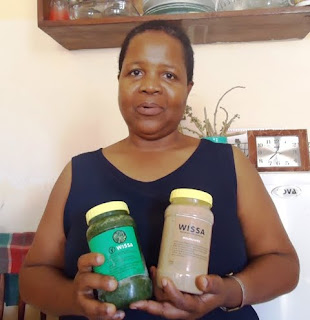
Relax, let me make your life easy. Do not spend so much time in the kitchen after a long day at work. This was the noble idea behind Wissa Ltd says its founder Judith Celeste Macuacua-Pinto and how she started making and selling ready-to-cook blended cassava leaves mixed with garlic and raw paw paw.
Today Wissa Ltd has grown into a small cottage industry with a diverse range of ready -to-eat and cook food products. It is also one of the enterprises benefiting from the UPoCA project in Mozambique.
The 56 year old widow says she closed her kindergarten in Maputo and moved to Nampula three years ago when her husband died. She first started processing castor oil but the company buying it was offering a very low price and so she changed to processing cassava leaves for making ‘mathapa’. This local delicacy made of cassava leaves cooked in coconut is very popular in Nampula but is tedious to prepare as the leaves have to be crushed to remove cyanide and soften them for cooking.
In 2008, she attended a meeting at the University of Eduardo Mondlane in Maputo, the first university in the country, on cassava processing. After the training, she requested for processing machines and after some negotiations she received a grater and 20 drying trays in October 2009 and started processing the crop.

In 2009, she attended a series of trainings by UPoCA on processing cassava into marketable items such as high quality cassava flour, rale and starch as well as making a diverse range of products from the flour.
She was also trained on maintaining hygiene and safety standards, and packaging, labeling and marketing and says she has tried to implement everything she learnt. She worked with a designer in Maputo to make neat labels and has also sent samples to the government lab to get feedback on the nutrition and their safety.
She says she is now processing more than a tonne of high quality cassava flour in a month but the market is still low as the community prefers dark flour made from moldy cassava to make their local dish ‘karakata’.
“For them, the darker the flour, the more delicious the ‘karakata’ is. They need some time to get used to the idea of white flour,” she said.

She also worked with UPoCA’s Agro-Enterprise Specialist, Melba Davis-Mussagy to develop a business plan. She says this has been a very useful exercise that led her to realize she was selling her cassava flour at a loss.
“From the business plan, I discovered I was selling a kg of cassava flour at 15 MZN but that barely meet the costs of the packaging material, the content and the labor costs. There was no profit. So I have now adjusted my price and sell at 25 MZN,” she said.
According to Davis-Mussagy, very few of the small-scale enterprises that UPoCA is supporting have business plans to guide their costing and future growth.
“I found out they did not know how to cost a kg of any of their products. They just set a price and they could not explain why and as a result, they were selling at a loss,” she said. “They have now understood the importance of detailing everything from their own labor, material, and transport costs. They also know which products give them the most profit.”
.gif)
Her bravery made her successful, sometimes we need to realize that losing someone should not lead us to be sadness but instead will bring us into something new and productive. This is what happened to this very inspiring story. For me she is a one of the famous women in business.
ReplyDelete